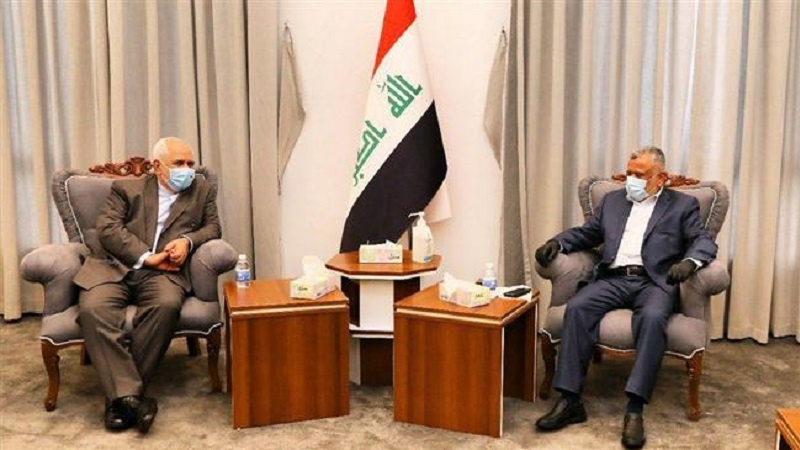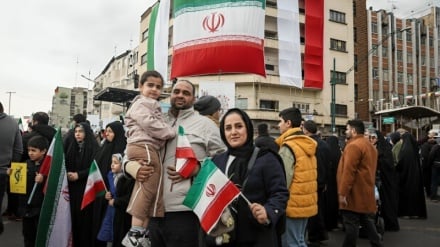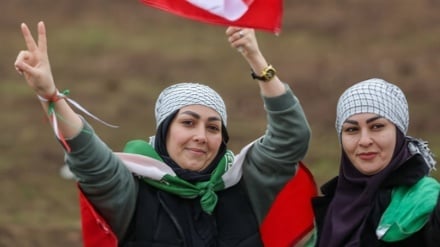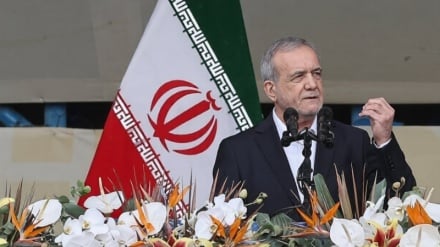Zarif: US, Israel’s hostility toward regional countries is inherent
Foreign Minister says the bellicose behavior displayed by the United States and the illegal Zionist entity toward the countries in West Asia is inherent to the duo, and they cannot alter this reality by adopting makeshift policies.
According to Press TV, Mohammad Javad Zarif made the remarks on Sunday in a meeting in the Iraqi capital, Baghdad, with Hadi al-Ameri, the head of the Fatah (Conquest) Alliance in Iraq’s Parliament.
“The hostility that America and the Zionist regime show toward regional countries is inherent to them,” Iran’s top diplomat said, adding, “Some people think that this reality can be changed through adoption of certain policies, but it won’t happen.”
Even other countries in the region, Zarif said, cannot befriend Israel, because the regime will eventually show its belligerent nature toward them one day.
“We know that what is happening to you or Syria and Lebanon is due to this resistance [against the US and Israel] as the Islamic Republic of Iran is also under pressure because of such [similar] positions,” Zarif told the Iraqi lawmaker.
Iran's top diplomat called on officials of these four countries to notice that they have all been targeted by the US and Israel, and it is not an issue related to just one country.
“Regional states should comprehend this reality that they can thwart such pressure if they work together,” Zarif emphasized.
Elsewhere in his remarks, Zarif said pursuing the case of the martyrdom of the Iranian and Iraqi commanders of the anti-terrorism fight in Iraq, Lieutenant General Qassem Soleimani and Abu Mahdi al-Muhandis, is on the agenda of his Baghdad visit.
Pointing to a recent report by Agnes Callamard, United Nations special rapporteur on extrajudicial, summary or arbitrary executions, on the assassination of Soleimani and Muhandis, the top Iranian diplomat emphasized that this case can be pursued at an international level.
For his part, Ameri expressed confidence about a bright horizon in relations between Tehran and Baghdad, noting that no third party can cast doubts on the two countries' relations.
He hailed the leading role of Iran, particularly General Soleimani, in Iraq's victory against Daesh, saying that Iran's support was a major reason behind Iraq's triumph over Daesh.
The Iraqi official added that the country should not turn into a place for settlement of scores and a base for aggression against regional countries, especially Iran, adding, “We have clearly informed the Americans of this issue.”
He said the Iraqi Parliament will seriously implement a decision it has already made to expel foreign, especially US, military forces from the country.
Earlier on Sunday, Zarif had a meeting with President Barham Salih.
The two sides discussed historical relations between Tehran and Baghdad, noting that the all-out development of those relations would benefit both nations as well as other countries in the region.
Zarif and President Barham also talked about the latest developments in bilateral relations and issues of importance to the further promotion of economic and trade ties.
They also discussed measures taken to follow up on the January 3 assassination, the most important regional and international matters, as well as other issues of mutual interest.
Also on Sunday, the Iranian Foreign Minister met and conferred with Ammar al-Hakim, the leader of Iraq's National Wisdom Movement.
During the meeting, the two sides discussed the situation in Iraq and problems that Baghdad faces in various economic sectors as a result of reduced oil revenues and the deadly coronavirus pandemic.
They also discussed the political situation and ongoing developments in the region.
Hakim told Zarif that Iraq supports development of relations with Iran in various fields, while emphasizing his movement’s support for the government of Prime Minister Mustafa al-Kadhimi.
“We support the policies adopted by the new Iraqi government for the development of relations with various countries, including our neighbors,” Hakim said.
Iran’s top diplomat also had a meeting with Falih al-Fayyadh, the leader of Iraq’s Popular Mobilization Units, known as Hashd al-Sha’abi in Arabic.
Zarif told Fayyadh that the Islamic Republic will seriously follow up on the assassination case through international legal bodies.
Fayyadh, for his part, thanked the Islamic Republic of Iran for the support it offered Iraq for the annihilation of Daesh.
He added that Iran’s help in defeating Daesh in Iraq will forever be remembered in the history of Iraq.
The two sides discussed the latest developments in bilateral relations between Tehran and Baghdad, developments in Iraq, and the decision made by Iraq’s government, people and parliament to expel all foreign forces, especially US forces, from the country.
In a separate meeting with Iraq's Parliament Speaker Mohammed al-Halbousi, the two sides discussed the latest developments in the region and the world as well as the situation in Iraq.
SS



